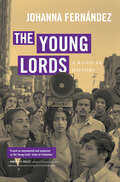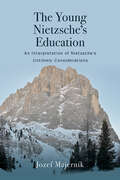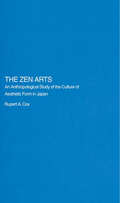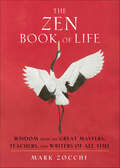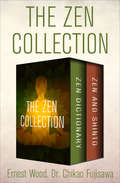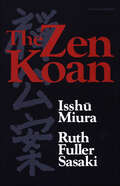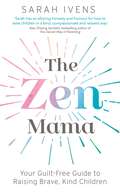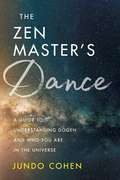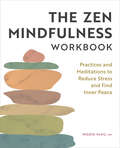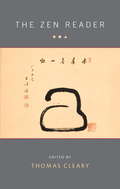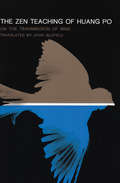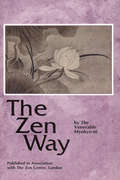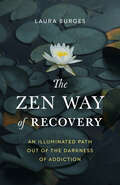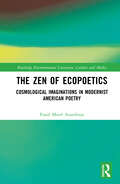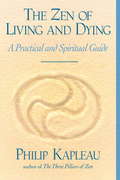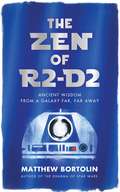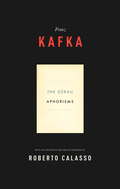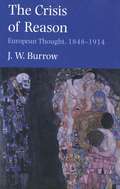- Table View
- List View
The Young Lords: A Radical History
by Johanna FernándezAgainst the backdrop of America's escalating urban rebellions in the 1960s, an unexpected cohort of New York radicals unleashed a series of urban guerrilla actions against the city's racist policies and contempt for the poor. Their dramatic flair, uncompromising socialist vision for a new society, skillful ability to link local problems to international crises, and uncompromising vision for a new society riveted the media, alarmed New York's political class, and challenged nationwide perceptions of civil rights and black power protest. The group called itself the Young Lords.Utilizing oral histories, archival records, and an enormous cache of police surveillance files released only after a decade-long Freedom of Information Law request and subsequent court battle, Johanna Fernandez has written the definitive account of the Young Lords, from their roots as a Chicago street gang to their rise and fall as a political organization in New York. Led by poor and working-class Puerto Rican youth, and consciously fashioned after the Black Panther Party, the Young Lords occupied a hospital, blocked traffic with uncollected garbage, took over a church, tested children for lead poisoning, defended prisoners, fought the military police, and fed breakfast to poor children. Their imaginative, irreverent protests and media conscious tactics won reforms, popularized socialism in the United States and exposed U.S. mainland audiences to the country's quiet imperial project in Puerto Rico. Fernandez challenges what we think we know about the sixties. She shows that movement organizers were concerned with finding solutions to problems as pedestrian as garbage collection and the removal of lead paint from tenement walls; gentrification; lack of access to medical care; childcare for working mothers; and the warehousing of people who could not be employed in deindustrialized cities. The Young Lords' politics and preoccupations, especially those concerning the rise of permanent unemployment foretold the end of the American Dream. In riveting style, Fernandez demonstrates how the Young Lords redefined the character of protest, the color of politics, and the cadence of popular urban culture in the age of great dreams.
The Young Nietzsche's Education: An Interpretation of Nietzsche's Untimely Considerations
by Jozef MajerníkA new interpretation of what is arguably Nietzsche's most neglected work.This study is an interpretation of the four essays that comprise Nietzsche's Untimely Considerations (also called the Untimely Meditations) as a single, coherent whole whose focus is to educate their readers toward self-cultivation and genuine culture and ultimately to the philosophic life. Jozef Majerník engages in a close reading of each of the essays, finding in them Nietzsche's theoretical understanding of human life in general as well as the best possible kind of life and plans for large-scale cultural reform in conjunction with Wagner's Bayreuth project. The focal point of Majerník's interpretation is the complex understanding of the nature of the human soul found in the Untimely Considerations, which he terms the "erotic-historic soul" after its two main constituent parts, desiring and memory. He argues that this conception of the soul is, at its core, the same model that we find in Nietzsche's mature works.
The Zen Arts: An Anthropological Study of the Culture of Aesthetic Form in Japan (Royal Asiatic Society Books)
by Rupert CoxThe tea ceremony and the martial arts are intimately linked in the popular and historical imagination with Zen Buddhism, and Japanese culture. They are commonly interpreted as religio-aesthetic pursuits which express core spiritual values through bodily gesture and the creation of highly valued objects. Ideally, the experience of practising the Zen arts culminates in enlightenment.This book challenges that long-held view and proposes that the Zen arts should be understood as part of a literary and visual history of representing Japanese culture through the arts. Cox argues that these texts and images emerged fully as systems for representing the arts during the modern period, produced within Japan as a form of cultural nationalism and outside Japan as part of an orientalist discourse.Practitioners' experiences are in fact rarely referred to in terms of Zen or art, but instead are spatially and socially grounded. Combining anthropological description with historical criticism, Cox shows that the Zen arts are best understood in terms of a dynamic relationship between an aesthetic discourse on art and culture and the social and embodied experiences of those who participate in them.
The Zen Book of Life: Wisdom from the Great Masters, Teachers, and Writers of All Time
by Mark ZocchiInspired by the teachings of the Buddha and other great masters, teachers, and writers, this is a book designed to help people connect to their inner divinity and find their spiritual path. It is overflowing with profound quotes, sayings, and insights, each presented alone, allowing the reader to dip in at any time. Each reading is guaranteed to inspire immediately and provide food for thought.Quotations and sayings have been chosen from Gautama Buddha and other "buddhas"--masters of spirituality and inspiration, such as Milarepa, Longchenpa, his Holiness the 14th Dali Lama, Thich Nhat Hanh, and Sogyal Rinpoche, along with other "greats" including Cicero, Rumi, Lao Tzu, Mother Teresa, and Shakespeare.A wonderful book to place on your office desk, coffee table, or bookshelf or by your bed, it is designed to provide daily comfort, wisdom, and spiritual nourishment.
The Zen Collection: Zen Dictionary and Zen and Shinto
by Ernest Wood Dr. Chikao FujisawaTwo classic texts essential to understanding Zen Buddhism—its ideas, history, and profound cultural legacy. In Zen Dictionary, theosophist Ernest Wood offers a comprehensive guide to the most important Zen ideas, along with a general history of the growth of Zen in China and Japan. Presenting names and terms in alphabetical order, Zen Dictionary is an ideal reference text for any student of Zen. More than just a survey of Zen and Shinto, Dr. Chikao Fujisawa&’s Zen and Shinto is an impassioned plea to restore Shinto as the cornerstone of Japanese life and thought. Fujisawa offers new insight into the depth and vitality of Japanese culture, demonstrating its remarkable capacity to assimilate foreign thought and ideas, and thus contribute to the world&’s hope for permanent peace.
The Zen Koan: Its History and Use in Rinzai Zen
by Isshu Miura Ruth Fuller SasakiThe first scholarly examination in any language of the historical development and traditional method of koan study in Zen Buddhism. Foreword by Ruth Fuller Sasaki; Index; ink drawings by Hakuin Ekaku.A Helen and Kurt Wolff Book.
The Zen Mama: Your guilt-free guide to raising brave, kind children
by Sarah IvensLet go of parenting expectations and fears to raise courageous, confident children.The Zen Mama philosophy is that mother and child complement each other in adventures and experiences, always putting safety first but without getting caught up in the anxieties, drama, impossible expectations and mental baggage that too often comes along with modern parenting. Learning to become a Zen Mama will help you grow and nurture a Zen Child - someone who isn't afraid to be different, who can stand up for himself or his friends, and can travel the world and experiment with new things without being overwhelmed with self-doubt or being scared. Full of facts, actionable advice and practical tips, this book will be about combining the heart and the head with what works for you and your family, not comparing yourselves to others or meeting a societal standard. It will support and nurture the mother's journey like a wise and sympathetic friend and offers ideas and experience rather than judgement.The Zen Mama will help you to find your purpose as a mother. It will instil the self-belief you need to help create a resilient, creative, caring and smart child - and help to survive the journey.
The Zen Mama: Your guilt-free guide to raising brave, kind children
by Sarah IvensLet go of parenting expectations and fears to raise courageous, confident children.The Zen Mama philosophy is that mother and child complement each other in adventures and experiences, always putting safety first but without getting caught up in the anxieties, drama, impossible expectations and mental baggage that too often comes along with modern parenting. Learning to become a Zen Mama will help you grow and nurture a Zen Child - someone who isn't afraid to be different, who can stand up for himself or his friends, and can travel the world and experiment with new things without being overwhelmed with self-doubt or being scared. Full of facts, actionable advice and practical tips, this book will be about combining the heart and the head with what works for you and your family, not comparing yourselves to others or meeting a societal standard. It will support and nurture the mother's journey like a wise and sympathetic friend and offers ideas and experience rather than judgement.The Zen Mama will help you to find your purpose as a mother. It will instil the self-belief you need to help create a resilient, creative, caring and smart child - and help to survive the journey.
The Zen Master's Dance: A Guide to Understanding Dogen and Who You Are in the Universe
by Jundo CohenZen Master's Dance makes some of Zen&’s subtlest teaching deeply personal and freshly accessible.Eihei Dogen—the thirteenth-century Japanese Zen Master of peerless depth and subtlety—heard the music of the universe that sounds as all events and places, people, things, and spaces. He experienced reality as a great dance moving through time, coming to life in the thoughts and acts of all beings. It is a most special dance, the dance that the whole of reality is dancing, with nothing left out. All beings are dancing, and reality is dancing as all beings. In The Zen Master&’s Dance, Jundo Cohen takes us deep into the mind of Master Dogen—and shows us how to join in the great and intimate dance of the universe. Through fresh translations and sparkling teaching, Cohen opens up for us a new way to read one of Buddhism&’s most remarkable spiritual geniuses.
The Zen Mindfulness Workbook: Practices and Meditations to Reduce Stress and Find Inner Peace
by Ingrid Yang MDCultivate calm through Zen mindfulness It's all too easy to walk through the world preoccupied by our endless thoughts. But that can get in the way of living in the moment and truly experiencing all that life has to offer. This workbook shows you how to quiet your mind and release worry. It examines mindfulness through the lens of Zen teachings and provides exercises that leave you feeling calm, present, and open to possibility. Learn about Zen—Explore the basic tenets of Zen Buddhism, how they can help you let go, and how they enable you to connect with yourself. Take a deep dive into mindfulness—Understand the Seven Pillars of mindfulness, how to achieve a mindful state, and the positive effects of mindfulness, such as better focus and lower blood pressure. Develop your practice—Create your own Zen-based mindfulness practice with a wide range of guided meditations, practical exercises, and inspiring affirmations. Start living mindfully and alleviate anxiety with this comprehensive Zen mindfulness workbook.
The Zen Reader
by Thomas ClearyFounded by Bodhidharma centuries ago in China, Zen and its teachings have since spread widely, exerting a tremendous cultural influence not only across Asia, but also the modern West. To this day, Zen inspires young and old, from all walks of life, to see the world with fresh eyes--beyond our usual assumptions and prejudices. This compendium of a thousand years of Zen teaching presents the essence of the tradition through stories, sayings, talks, and records of heart-to-heart encounters with Zen masters. The great expositors of the tradition, whose voices are recounted here, encourage us to let go of our clinging and intellectual grasping, and to open ourselves to embrace reality exactly as it is.
The Zen Teaching of Huang Po: On the Transmission of Mind (Books That Changed the World)
by Huang PoThis complete collection of teachings by the 9th century Zen Master has been an essential text in the study of Zen for centuries—now available in English.This translation of the original collection of sermons, dialogues, and anecdotes of Huang Po, the illustrious Chinese master of the Tang Dynasty, allows the Western reader to gain an understanding of Zen from the original source, one of the key works in its teachings. It also offers deep and often startling insights into the rich treasures of Eastern thought. Nowhere is the use of paradox in Zen illustrated better than in the teaching of Huang Po, who is regarded as the founder of the great Lin Chi sect. He demonstrates that the experience of intuitive knowledge, which reveals to a man what he is, cannot be communicated in words. With the help of these paradoxes, beautifully and simply presented in this collection, Huang Po could set his disciples on the right path. It is in this fashion that the Zen master lead his listener into truth, often by a single phrase designed to destroy his particular demon of ignorance.John Blofeld’s translation reflects his deep understanding of Zen and gives this historical text a clear and faithful presentation.
The Zen Way
by Myokyo-NiMyokyo-ni is the Buddhist name of Dr. Irmgard Schloegl, who directs the Zen center Shobo-an in London. Here she seeks to describe Zen and Zen practice from a few different approaches, presenting basic Buddhist thought as well as an overview of the life of the historical Buddha. She gives a section on training in a Japanese Rinzai Zen monastery-perhaps the most unique feature of the book, although her presentation is rather impersonal. Her final section, "Fundamentals," is rambling and might have benefited from further organization and subdivision. The author's style throughout is decidedly Western, with a psychological, philosophical tone that does not sit comfortably with some of the more esoteric writings in the field. For an introduction to the subject, there are better sources, such as Robert Aitken's Taking the Path of Zen (Farrar, 1982). For serious students of Zen, there are valuable insights hidden in the sometimes difficult but heartfelt analyses scattered through the book.
The Zen Way
by Myokyo-NiMyokyo-ni is the Buddhist name of Dr. Irmgard Schloegl, who directs the Zen center Shobo-an in London. Here she seeks to describe Zen and Zen practice from a few different approaches, presenting basic Buddhist thought as well as an overview of the life of the historical Buddha. She gives a section on training in a Japanese Rinzai Zen monastery-perhaps the most unique feature of the book, although her presentation is rather impersonal. Her final section, "Fundamentals," is rambling and might have benefited from further organization and subdivision. The author's style throughout is decidedly Western, with a psychological, philosophical tone that does not sit comfortably with some of the more esoteric writings in the field. For an introduction to the subject, there are better sources, such as Robert Aitken's Taking the Path of Zen (Farrar, 1982). For serious students of Zen, there are valuable insights hidden in the sometimes difficult but heartfelt analyses scattered through the book.
The Zen Way of Recovery: An Illuminated Path Out of the Darkness of Addiction
by Laura BurgesAn accessible, compassionate guide to Buddhist principles and practices that can help support recovery from addictions and addictive behaviors—written by an experienced lay teacher with long-term recovery.For anyone struggling with addiction, Buddhism offers powerful, grounding wisdom and tools to help support recovery. In The Zen Way of Recovery, Laura Burges shares her experience as a dedicated Zen practitioner who came to terms with her own addiction to alcohol and found support for her recovery. Through the lens of Buddhist teachings, Burges offers tools and practices which, together with the help of recovery programs, can offer a road to sobriety. Burges is an experienced and compassionate guide, and her message is resonant for people with any type of addictive behavior—and for people who aren&’t necessarily familiar with Buddhism. Her teachings are drawn from the Buddha's life and teachings (specifically the Eight Awarenesses of the Awakened Being and the Six Paramitas), and the wisdom of Japanese Buddhist priest Dogen Zenji, the founder of the Soto school of Zen, among others. Burges emphasizes the importance of being in an active recovery program, and the teachings and practices she offers in each chapter—including reflections, journaling prompts, meditations, instructions for setting up and altar and zazen—are both a perfect adjunct and powerful reinforcement. Examples of reflections and journaling prompts include: Do you still hear the critical, contemptuous, sarcastic voice of a parent or partner in your own head?Do you sometimes hear yourself mirroring this negative voice with others?What were the models of relationship that you grew up with?What are ways that you can cultivate more patience?Check in with yourself to see if tiredness, hunger, loneliness, or anger is affecting your thinking in the moment.
The Zen of Ecopoetics: Cosmological Imaginations in Modernist American Poetry (Routledge Environmental Literature, Culture and Media)
by Enaiê Mairê AzambujaThis book is the first comprehensive study investigating the cultural affinities and resonances of Zen in early twentieth-century American poetry and its contribution to current definitions of ecopoetics, focusing on four key poets: William Carlos Williams, Marianne Moore, Wallace Stevens, and E.E. Cummings. Bringing together a range of texts and perspectives and using an interdisciplinary approach that draws on Eastern and Western philosophies, including Zen and Taoism, posthumanism and new materialism, this book adds to and extends the field of ecocriticism into new debates. Its broad approach, informed by literary studies, ecocriticism, and religious studies, proposes the expansion of ecopoetics to include the relationship between poetic materiality and spirituality. It develops ‘cosmopoetics’ as a new literary-theoretical concept of the poetic imagination as a contemplative means to achieving a deeper understanding of the human interdependence with the non-human. Addressing the critical gap between materialism and spirituality in modernist American poetry, The Zen of Ecopoetics promotes new forms of awareness and understanding about our relationship with non-human beings and environments. It will be of interest to scholars, researchers, and students in ecocriticism, literary theory, poetry, and religious studies.
The Zen of Living and Dying: A Practical and Spiritual Guide
by Philip KapleauTo live life fully and die serenely--surely we all share these goals, so inextricably entwined. Yet a spiritual dimension is too often lacking in the attitudes, circumstances, and rites of death in modern society. Kapleau explores the subject of death and dying on a deeply personal level, interweaving the writings of Western religions with insights from his own Zen practice, and offers practical advice for the dying and their families.
The Zen of R2-D2: Ancient Wisdom from a Galaxy Far, Far Away
by Matthew BortolinEntertaining and engaging, this new follow-up to Wisdom&’s bestseller The Dharma of Star Wars stands on its own and will captivate a broad audience with the Star Wars story from a Buddhist perspective.Did you ever wonder why R2-D2 is: Always calm and cool under pressure, The key to the rebellion&’s survival, The one who never fails to save the day? Could it be because he&’s secretly a Zen master? Discover your inner R2—and the truth about who you really are! This delightful and illuminating romp unfolds in the form of a fictional dialogue between the author—a die-hard Star Wars devotee with a deep connection to Zen—and two cosplayers dressed as C-3PO and R2-D2 who insist on being called by their character names. Along the way, you&’ll come to see what everyone&’s favorite astromech can teach us about peace, happiness, and life&’s true meaning.
The Zurau Aphorisms of Franz Kafka
by Franz KafkaThe essential philosophical writings of one of the twentieth century's most influential writers are now gathered into a single volume with an introduction and afterword by the celebrated writer and publisher Roberto Calasso. Illness set him free to write a series of philosophical fragments: some narratives, some single images, some parables. These "aphorisms" appeared, sometimes with a few words changed, in other writings--some of them as posthumous fragments published only after Kafka's death in 1924. While working on K., his major book on Kafka, in the Bodleian Library, Roberto Calasso realized that the Zürau aphorisms, each written on a separate slip of very thin paper, numbered but unbound, represented something unique in Kafka's opus--a work whose form he had created simultaneously with its content.The notebooks, freshly translated and laid out as Kafka had intended, are a distillation of Kafka at his most powerful and enigmatic. This lost jewel provides the reader with a fresh perspective on the collective work of a genius.
The construction zone: Working for Cognitive Change in School
by Michael Cole Denis Newman Peg GriffinIn its description of several years of painstaking classroom observations and carefully crafted experimental interventions, the 'construction zone' makes clear the cleavage lines between the everyday requirements of classroom teaching and the practice of experimental psychologists. The best intentions of researchers to improve education are often undermined by such differences. The 'construction zone' is the shared psychological space within which teachers construct environments for their students' intellectual development and students construct deeper understandings of the cultural heritage embodied in the curriculum. The core of the book is a set of analyses of children's developmental changes during classroom lessons and individual tutorials designed to teach basic concepts in such diverse areas as natural science, social studies, and arithmetic. Fusing techniques currently in wide use in microsociology, experimental psychology, and ethnographic studies of the classroom, the authors offer a compelling vision of intellectual development as a process of joint constructive interaction mediated by cultural artifacts. Their approach makes it possible to retain the strength of a developmental perspective which treats intellectual change as a constructive process in the spirit of Piaget, while making it clear that developmental change is simultaneously a social process of cultural transformation as emphasized by Vygotsky and his students.
The crisis of reason: European thought, 1848-1914
by J. W. BurrowThis elegant and skilful book explores the history of ideas in Europe from the revolutions of 1848 to the beginning of the First World War. Broader than a straight survey, deeper and richer than a textbook, the work seeks to place the reader in the position of 'an informed eavesdropper on the intellectual conversations of the past. <P><P> After an introductory chapter which introduces the mental world of the mid-nineteenth century, Burrow explores the impact of science and social thought on European intellectual life, considering ideas in physics, through social evolution and Social Darwinism, to anxieties about modernity and personal identity. His discussion also takes in powerful and fashionable concepts in evolution, art, myth, the occult and the unconscious mind, considers the rise of the great cities of Berlin, Paris and London, and the work of literary writers, philosophers and composers. The text is populated by most of the great and many of the lesser known intellectual figures of the age, from Mill, Bakunin, Nietzsche, Bergson and Renan to Pater, Proust, Clough, Flaubert, Wagner and Wilde. A work of rare distinction and considerable erudition, the book is written in a graceful,
The foundations of modern political thought
by Quentin SkinnerA two-volume study of political thought from the late thirteenth to the end of the sixteenth century, the decisive period of transition from medieval to modern political theory. The work is intended to be both an introduction to the period for students, and a presentation and justification of a particular approach to the interpretation of historical texts. Volume One deals with the Renaissance, Volume Two with the Age of Reformation. Quentin Skinner gives an outline account of all the principal texts of the period, discussing in turn the chief political writings of Dante, Marsiglio, Bartolus, Machiavelli, Erasmus and more, Luther and Calvin, Bodin and the Calvinist revolutionaries. But he also examines a very large number of lesser writers in order to explain the general social and intellectual context in which these leading theorists worked. He thus presents the history not as a procession of 'classic texts' but are more readily intelligible. He traces by this means the gradual emergence of the vocabulary of modern political thought, and in particular the crucial concept of the State. We are given an insight into the actual processes of the formation of ideologies and into some of the linkages between political theory and practice. The work aspires, in this sense, to give the first genuinely historical account of the political thought of the period.
The principles of representative government
by Bernard ManinThe thesis of this original and provocative book is that representative government should be understood as a combination of democratic and undemocratic elements. Challenging the conventionally held views on the subject, Professor Manin reminds us that while today representative institutions and democracy appear as virtually indistinguishable, when representative government was first established in Europe and America, it was designed in opposition to democracy proper. The author identifies the essential features of democratic institutions and reviews the history of their application.
The realistic empiricism of Mach, James, and Russell
by Erik C. BanksIn the early twentieth century, Ernst Mach, William James, and Bertrand Russell founded a philosophical and scientific movement known as 'neutral monism', based on the view that minds and physical objects are constructed out of elements or events which are neither mental nor physical, but neutral between the two. This movement offers a unified scientific outlook which includes sensations in human experience and events in the world of physics under one roof. In this book Erik C. Banks discusses this important movement as a whole for the first time. He explores the ways in which the three philosophers can be connected, and applies their ideas to contemporary problems in the philosophy of mind and the philosophy of science - in particular the relation of sensations to brain processes, and the problem of constructing extended bodies in space and time from particular events and causal relations.
The structure of enquiry in Plato's early dialogues
by Vasilis PolitisThis book proposes and defends a radically new account of Plato's method of argument and enquiry in his early dialogues. Vasilis Politis challenges the traditional account according to which these dialogues are basically about the demand for definitions, and questions the equally traditional view that what lies behind Plato's method of argument is a peculiar theory of knowledge. He argues that these dialogues are enquiries set in motion by dilemmas and aporiai, incorporating both a sceptical and an anti-sceptical dimension, and he contends that Plato introduces the demand for definitions, and the search for essences, precisely in order to avoid a sceptical conclusion and hold out the prospect that knowledge can be achieved. His argument will be of great value to all readers interested in Plato's dialogues and in methods of philosophical argument more generally.
